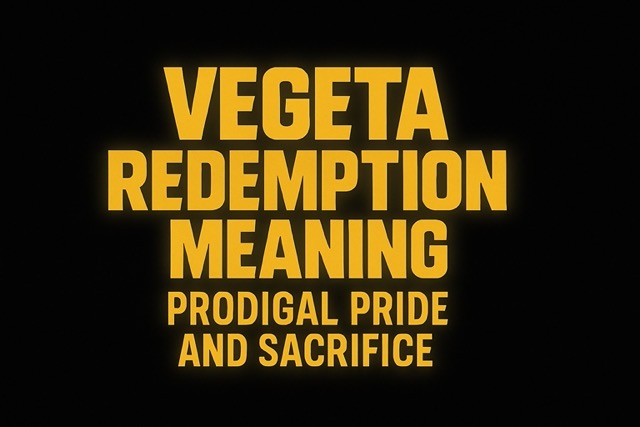The vegeta redemption meaning reaches its most powerful expression during the Buu Saga in Dragon Ball Z. Once obsessed with pride and power, Vegeta kneels before his son and chooses death—not for glory, but for love.
His decision marks more than a tactical move. It’s a moral turning point, a spiritual awakening.
“This son of mine was dead and is alive again; he was lost and is found.” — Luke 15:24
Vegeta’s transformation mirrors a familiar biblical arc—the story of the prodigal son. Through this lens, anime fans glimpse a profound truth about repentance, sacrifice, and redemption.
Related reading: Dragon Ball Z Symbolism: Sacrifice, Redemption, and the Bible
⚔️ Battling Pride: Vegeta vs. Himself
The vegeta redemption meaning begins with the struggle against pride. Vegeta’s first true enemy wasn’t Goku or Frieza—it was his own obsession with superiority.
From the start, he rejected compassion, teamwork, and even love. Strength defined him, and weakness shamed him.
“Pride goes before destruction, and a haughty spirit before a fall.” — Proverbs 16:18
He fell repeatedly. Each fall stripped more of his ego, and slowly, a change emerged beneath his armor.
🧎♂️ The Turning Point: Sacrificing for His Son
When Majin Buu threatens Earth, Vegeta faces a grim reality: brute force won’t win. Recognizing the threat his past pride helped unleash, he takes a drastic step.
He embraces Trunks. After that, he knocks him out for safety. Then, with no audience and no reward, he gives his life.
“Greater love has no one than this: to lay down one’s life for one’s friends.” — John 15:13
There’s no pride left in that moment—only love. And that’s when redemption takes root.
🧭 The Prodigal Warrior: A Gospel Parallel
Luke 15 tells of a prodigal son who leaves home to chase fulfillment but returns in shame. Instead of punishment, he finds grace.
“He was lost and is found.” — Luke 15:24
Vegeta, too, abandoned what was good in pursuit of power. Through suffering and failure, he comes home—not physically, but spiritually.
He finally admits:
“You are better than me, Kakarot. You are the best.”
That confession isn’t weakness. It’s rebirth.
🌱 New Legacy: Vegeta After His Redemption
Vegeta’s death isn’t the end. When he returns, everything is different.
Now, he fights for peace. He uplifts others. He shows love more freely. No longer defined by pride, he becomes not just a fighter, but a protector, father, and man of integrity.
“If anyone is in Christ, he is a new creation; the old has gone, the new is here!” — 2 Corinthians 5:17
His redemption is less about what he does—and more about who he becomes.
Related article: Was Jesus a Madman?
🔥 What Vegeta’s Redemption Meansv for Us
True redemption doesn’t mean perfection. Rather, it means turning back.
Vegeta was angry, selfish, and broken. Yet even he wasn’t beyond grace. And neither are we.
The Bible is filled with flawed heroes who chose love over pride: Saul became Paul. Peter went from denier to leader. A thief hung beside Jesus… and was welcomed into paradise.
Redemption isn’t fiction. It’s the greatest reality.
And if it can be seen in a Saiyan prince, it can be seen in anyone.
📚 Related Reading
🔥 Dragon Ball Z Symbolism: Sacrifice, Redemption, and the Bible
Explore how major DBZ moments, including Vegeta’s transformation, echo powerful biblical truths.
👉 Read more
✝️ Goku Sacrifice Meaning: Gospel Parallels in Dragon Ball Z
Analyze Goku’s selfless act during the Cell Games and its reflection of gospel themes.
👉 Read more
🧠 Was Jesus a Madman? Evidence of His Sanity and Legacy
Investigate the historical and psychological evidence supporting Jesus’s claims and teachings.
👉 Read more
🎥 Vegeta’s Story of Redemption | The Anatomy of Dragon Ball Z
A comprehensive video analysis of Vegeta’s character arc and redemption journey.
👉 Watch on YouTube
🧘 Vegeta’s Pride & Rebuilding of Self
An insightful article examining how Vegeta’s pride evolves into a source of strength and humility.
👉 Read more

❓FAQ: Vegeta’s Redemption and the Bible
Why did Vegeta sacrifice himself in the Buu Saga?
To protect his family and the world. His choice was grounded in love, not pride.
Does Vegeta’s redemption follow a biblical pattern?
Yes. His journey closely resembles the story of the prodigal son and other biblical examples of repentance.
How is Vegeta different after his sacrifice?
He becomes more selfless. He values peace, family, and humility over strength.
Is there a spiritual message in Vegeta’s story?
Absolutely. While not overtly religious, it echoes gospel themes of transformation and redemption.

